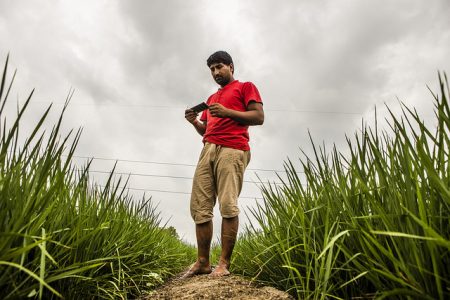
JAWHAR, India (CIMMYT) – A new project is bringing sustainable technologies and practices to one-thousand villages in Maharashtra, India, the second most populous state in the country and an area that is particularly vulnerable to climate change effects like erratic rainfall, heat waves, sea water intrusion and other climatic risks.
Agriculture provides income for over half of Maharashtra’s population, yet productivity is severely affected by climate change and unsustainable agricultural practices that degrade soil quality. In 2015 alone 60 percent of villages in the state suffered drought affecting nearly nine million farmers.
New “climate smart” practices are critical if farmers in Maharashtra are to survive future climatic shocks, improve productivity and maintain a healthy ecosystem. The state has the second largest tribal population in the country, with most of these communities inhabiting fringe forest settlements and degraded lands which have low productivity and high vulnerability to erosion, making it even more vital farmers adopt sustainable practices.
A Climate Smart Village Programme for the Tribal Regions of Maharashtra was launched to promote these practices – such as zero-till farming, integrated nutrient and water management and proper harvesting and storage – targeting farmers across Maharashtra’s tribal belt.
The three-year project, launched in 2016, is being implemented across over 1,000 villages in the state. Last year, 100 primary villages were identified as most likely to adopt climate smart practices in Maharashtra’s three districts and chosen to implement sustainable agriculture practices. Farmers groups from each primary village will link for the last two years of the project with nine skilled-up villages – villages where at least one climate smart practice has been adopted – to share and help implement climate smart farming practices and techniques.
Large quantities of improved seed that are resilient to drought, heat and other stresses are also being provided to use alongside these practices, ensuring maximum yield.
A key aspect of the program is ensuring that the climate smart technologies being promoted are adapted to local conditions – it’s critical that these new tools can be used by small and marginal farmers at an affordable cost. The International Maize and Wheat Improvement Center through the Borlaug Institute for South Asia (BISA) are currently distributing different small scale farm machineries like fertilizer drills and threshers that are catered to farmer preferences, including women farmers in the 100 primary villages.
Information and Communication Technology (ICT) advisories will also be provided to farmers to ensure they have access to real-time information on weather forecasts, pest and disease outbreaks, market intelligence and more. BISA in collaboration with IFFCO Kishan Sanchar Limited, a telecommunications company in New Delhi, will release a mobile based ICT service in 2017 to provide advisories to enrolled farmers. 4,000 farmers have been selected for the service this year. The service will be constantly monitored and upgraded as required to meet the needs of more than 50,000 farmers over the course of the project.
The final component of the project ensures that farmers are enrolled in crop insurance schemes, which is essential to protecting and reimbursing farmers should their crops fail under poor climate conditions. BISA enrolled 500 farmers for insurance from November 2016-March 2017 and in the process to enroll more farmers in the coming monsoon season during July-October of this year.
In early June, Shri Vishnu Savara, Minister of Maharashtra’s Tribal Development Office, chaired an event that brought delegates from across India to review the current progress of the project in Jawhar, Palghar District. The event was facilitated by BISA representatives including Senior Consultant Prakash Naik, Hub Coordinators Abhilash Gupta and Mahesh Maske, Executive Assistant Anu Raswant and Administrative Officer Manish Rai. The event was co-chaired by Shri R. G. Kulkarni, Commissioner of Maharashtra’s Tribal Development Office and Arun Joshi, CIMMYT Asia Regional Representative.
Savara emphasized the important impact climate smart agriculture coupled with improved seed can have on farm productivity across Maharashtra’s tribal areas, and new ability to adapt to future climatic shocks and extreme weather events.
 Capacity development
Capacity development